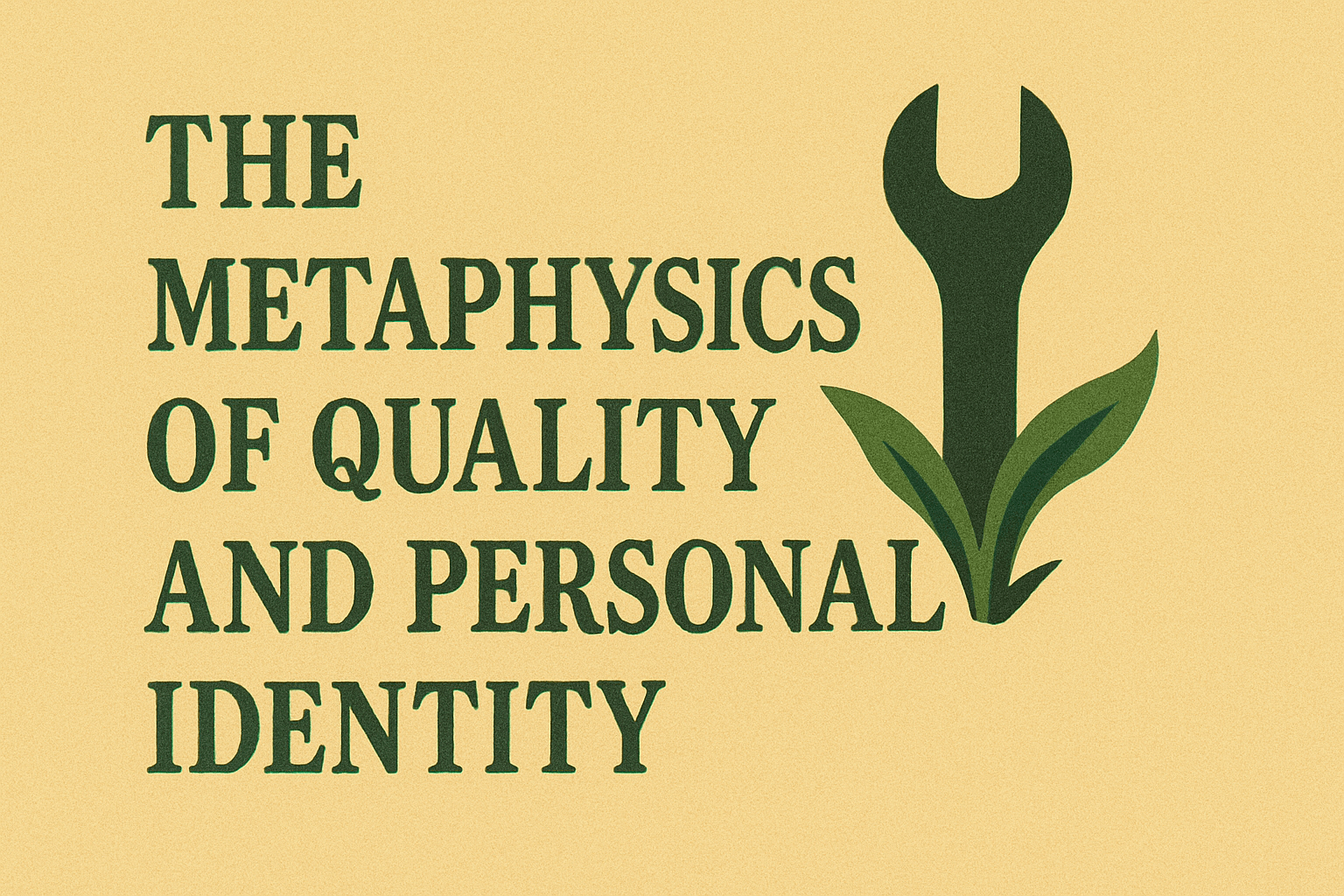Exploring how the concept of quality shapes personal identity and self-understanding, integrating Pirsig’s ideas with contemporary psychology and self-help practices.
Robert M. Pirsig’s Metaphysics of Quality (MOQ) offers a profound and unique framework for understanding reality, placing quality at the core of all experiences. This philosophy, introduced in Zen and the Art of Motorcycle Maintenance and further elaborated in Lila: An Inquiry into Morals, can significantly influence personal identity and self-understanding. By integrating Pirsig’s ideas with contemporary psychology and self-help practices, we can explore how the concept of quality shapes who we are and how we perceive ourselves.
Understanding the Metaphysics of Quality
Pirsig’s Metaphysics of Quality proposes that quality is the primary reality, preceding and transcending the traditional subject-object dichotomy. Quality is seen as the foundation from which all things arise, encompassing both static quality (the stable, structured aspects of life) and dynamic quality (the creative, changing forces). This dual nature of quality provides a comprehensive lens through which to examine personal identity and growth.
Quality and the Formation of Personal Identity
Personal identity is the sense of who we are, shaped by our experiences, values, beliefs, and interactions with the world. The concept of quality plays a crucial role in this process:
- Intrinsic Values and Authenticity: Pirsig’s emphasis on quality encourages individuals to seek intrinsic values and authenticity. By prioritizing what genuinely matters and striving for excellence in all endeavors, people can develop a more authentic sense of self. This pursuit of quality helps individuals align their actions with their true values, leading to a cohesive and genuine personal identity.
- Dynamic Growth and Self-Improvement: The dynamic aspect of quality emphasizes continuous growth and self-improvement. Embracing dynamic quality involves being open to new experiences, learning, and evolving. This ongoing process of self-improvement shapes personal identity by fostering adaptability, resilience, and a growth mindset.
- Balancing Stability and Change: Integrating static and dynamic quality involves balancing stability and change in one’s life. While static quality provides a foundation of established values and routines, dynamic quality drives personal growth and adaptation. This balance ensures that individuals maintain a stable sense of identity while continually evolving.
Integrating Pirsig’s Ideas with Contemporary Psychology
Contemporary psychology offers various theories and practices that complement Pirsig’s Metaphysics of Quality, providing practical tools for shaping personal identity:
- Self-Determination Theory (SDT): SDT, developed by Deci and Ryan, emphasizes the importance of intrinsic motivation and the pursuit of activities that fulfill basic psychological needs: autonomy, competence, and relatedness. Pirsig’s focus on quality aligns with SDT by encouraging individuals to engage in meaningful, high-quality activities that satisfy these needs, fostering a strong and positive identity.
- Positive Psychology: Positive psychology, pioneered by Martin Seligman, focuses on enhancing well-being and flourishing by cultivating strengths, virtues, and positive experiences. Pirsig’s philosophy can be integrated into positive psychology by emphasizing the pursuit of quality as a pathway to achieving a fulfilling and meaningful life.
- Mindfulness and Self-Awareness: Mindfulness practices, rooted in both Eastern philosophy and contemporary psychology, promote self-awareness and presence in the moment. Pirsig’s emphasis on quality resonates with mindfulness by encouraging individuals to fully engage with their experiences, enhancing self-understanding and personal identity.
Self-Help Practices Inspired by the Metaphysics of Quality
- Pursuing Excellence: Adopt a mindset of pursuing excellence in all areas of life, whether it’s work, hobbies, or relationships. Focus on the quality of your efforts and strive to do things to the best of your ability. This practice reinforces a positive self-concept and a sense of achievement.
- Setting Meaningful Goals: Set goals that reflect your intrinsic values and passions. Ensure that these goals align with your sense of quality and authenticity. Working towards meaningful goals fosters a sense of purpose and coherence in your identity.
- Embracing Change and Growth: Be open to change and view challenges as opportunities for growth. Embrace new experiences and learn from them, integrating dynamic quality into your life. This approach helps you build a resilient and adaptable identity.
- Practicing Mindfulness: Incorporate mindfulness practices into your daily routine to enhance self-awareness and presence. Mindfulness helps you connect with the quality of each moment, deepening your self-understanding and enriching your personal identity.
- Reflecting on Values and Beliefs: Regularly reflect on your values, beliefs, and experiences. Assess how they shape your identity and whether they align with your pursuit of quality. This reflection promotes a coherent and authentic sense of self.
Case Studies and Examples
- Professional Excellence: Consider a professional who excels in their career by consistently pursuing quality in their work. By setting high standards and continually improving their skills, they build a strong professional identity characterized by competence and integrity.
- Creative Pursuits: An artist who integrates quality into their creative process by experimenting with new techniques and seeking authentic expression. This dynamic engagement with their art fosters a unique and evolving artistic identity.
- Personal Growth: An individual who embraces personal growth by setting meaningful goals, practicing mindfulness, and reflecting on their values. This commitment to quality in personal development leads to a well-rounded and resilient identity.
Conclusion
Robert M. Pirsig’s Metaphysics of Quality offers a valuable framework for understanding and shaping personal identity. By prioritizing quality in all aspects of life and integrating dynamic growth with stable values, individuals can develop a more authentic, resilient, and fulfilling sense of self. Contemporary psychology and self-help practices provide practical tools to apply Pirsig’s ideas, promoting a deeper self-understanding and a more cohesive personal identity. Embracing the Metaphysics of Quality in personal development encourages a life of excellence, authenticity, and continuous growth.
